Mastering Bangus Cooking: A Complete Guide


Intro
When it comes to cooking with bangus—often referred to as milkfish—there's much more than meets the eye. It's not just about tossing the fish into a pan and hoping for the best. Rather, it's an intricate dance of flavors, techniques, and tradition that unveils the true potential of this popular seafood.
For many, the journey of mastering this fish begins from understanding its unique characteristics and nutritional profile, and delving into the rich cultural significance it holds in various regions. Whether you're new to the kitchen or have years of experience under your apron, this guide offers insight that can enhance your culinary creations with bangus.
Understanding bangus and its exquisite taste can elevate simple meals into memorable feasts. This guide will not just list recipes; it will provide step-by-step instruction on how to bring the best out of bangus, accompanied by tips that seasoned cooks swear by.
Let’s embark on this flavorful journey, one ingredient at a time.
Prelude to Bangus
Understanding the nuances of bangus, or milkfish, is crucial for any home cook looking to diversify their culinary skills. Bangus isn't just a staple in Filipino cuisine; it's a fish that connects with countless traditions around the world. Among the key benefits of learning about this fish are its unique taste, health benefits, and versatility in cooking. Different cultures have their own methods of preparation, making it a rich subject for exploration. By mastering bangus, you’re not just adding a new ingredient to your repertoire but also paying homage to culinary practices that have persisted through generations.
Definition and Characteristics
Bangus, scientifically known as Chanos chanos, is recognized for its delicate, flaky flesh and distinctive flavor that's often described as mildly sweet, with the texture that can be both firm and tender depending on how it's cooked. This fish can grow remarkably large, with specimens reaching lengths of over three feet. However, the consumer market typically sees bangus in more manageable sizes, around one to two pounds, making it more accessible in kitchens worldwide. A notable characteristic of bangus is its unique bone structure. Unlike many other fish, it has a layered bone system, which requires some skill to navigate when filleting. Being aware of these traits not only enhances cooking but ultimately leads to a more satisfying dining experience.
Culinary Significance Across Cultures
In various cultures, bangus shows up on main menus, often prepared in ways that highlight its flavors while respecting traditional cooking customs. In the Philippines, for example, bangus is a common sight, whether served grilled, stewed in a sour soup called sinigang, or marinated and fried in the famous daing na bangus. These dishes aren't merely meals; they symbolize comfort and nostalgia, often tied to family gatherings and celebrations.
"Cooking with bangus is a journey - from the way it's prepared to the stories shared at the table, it's about more than just the food."
Other regions, particularly in Southeast Asia, showcase bangus in their own unique recipes, infusing local flavors and ingredients. In parts of Indonesia and Malaysia, bangus is grilled over charcoal and often served with spicy sambals, while Mediterranean twists might incorporate bangus into pasta dishes or risottos. By embracing the culinary significance of bangus across cultures, home chefs can not only improve their cooking techniques but also foster a deeper appreciation for the traditions surrounding this versatile fish.
Nutritional Profile of Bangus
Understanding the nutritional profile of bangus is paramount for any cook looking to optimize their culinary creations. This fish, known for its versatility and unique flavor, isn’t just a treat for the palate; it also packs a punch when it comes to health benefits. The emphasis here lies not only in enjoying traditional recipes but also in appreciating bangus as an ingredient that supports a balanced diet. Integrating bangus into meals can elevate health standards while satisfying taste buds.
Macro and Micronutrients
Bangus is a treasure trove of nutrients. Firstly, its macro-nutrient profile is noteworthy; it typically contains:
- Protein: Bangus is a great source, with about 26 grams of protein per 100 grams. This is imperative for muscle recovery and growth, making it an excellent option for active individuals or those looking to maintain a healthy weight.
- Fat: It has healthy fats, particularly omega-3 fatty acids, which are pivotal for heart health. These fats can help reduce inflammation and are essential for brain function.
- Carbohydrates: Low in carbs, bangus is an ideal choice for those monitoring their carbohydrate intake.
In terms of micronutrients, bangus shines as well:
- Vitamin D: This nutrient is crucial for bone health and immune system support.
- Calcium and Phosphorus: Both contribute to bone strength.
- B vitamins: Important for energy metabolism, they play a key role in promoting overall well-being.
Essentially, bangus isn’t just another fish; it’s a nutrient-dense option that can easily be incorporated into various dishes, catering especially to health-conscious families.
Health Benefits of Incorporating Bangus into Your Diet
When contemplating the addition of bangus into your weekly menu, consider the multitude of health benefits it offers:
- Weight Management: The high protein content can keep folks satiated longer, which is a boon when trying to manage one’s weight.
- Heart Health: Thanks to omega-3s, eating bangus regularly can help maintain heart health. These fatty acids are known for lowering blood pressure and cholesterol levels.
- Mental Well-being: Studying links omega-3 intake with improved cognitive function has shown good signs for brain health; adding bangus into your diet may help keep the mind sharp.
- Bone Strength: Many families lean on bangus for its vitamin D and calcium contributions, vital for maintaining strong bones, especially in growing children and elderly individuals.
Incorporating bangus into your daily meals not only provides nutrition but it can be a delightful experience. With its mild flavor, it adapts to various cuisines, allowing kitchen creativity to flourish.
Sourcing Quality Bangus
When it comes to cooking bangus, securing high-quality fish is the foundation of your culinary adventure. The quality of the bangus, or milkfish, you choose can drastically affect both the flavor and the texture of your dishes. If you get this part right, everything else falls into place beautifully.
Identifying Fresh Bangus
To start, knowing how to pick fresh bangus is essential. Here are a few key pointers:
- Look at the Eyes: Fresh bangus should have clear and bright eyes. If they're cloudy or sunken, it's a sign that the fish is not fresh.
- Smell the Fish: A clean, oceanic smell is what you want. If it smells overly fishy or off, put it back.
- Check the Flesh: Press the flesh gently with your finger. It should bounce back quickly; if it leaves an indentation, it may be past its prime.
- Color Matters: The skin of fresh bangus should have a vibrant, metallic sheen. Dull color can indicate that it's not fresh.
A simple trick is to ask your fishmonger about the source. They should be able to tell you where the fish comes from and when it was caught. This information can guide you in making a better choice.
Sustainable Fishing Practices
Another crucial aspect of sourcing quality bangus revolves around sustainability. The seafood industry is often scrutinized for overfishing and harmful practices. Choosing bangus from sustainable sources not only contributes to healthier oceans but also typically ensures better quality fish.
- Look for Certifications: Organizations like the Marine Stewardship Council (MSC) certify fisheries that meet sustainability standards. Checking for these labels can guide you to responsibly sourced fish.
- Practice Awareness: Inquire about local fishing practices. Community-supported fisheries or direct-from-boat sales often provide freshness and sustainability.
- Support Local Markets: Visiting your local wet markets can benefit both your community and ensure you're buying fresh, often sustainably sourced fish. Plus, this encourages economic growth in your area.
By sourcing your bangus mindfully, you're not just ensuring quality; you’re also playing a role in the health of our oceans and the future of fishing communities. As you embark on your culinary journey, remember that what you put on your plate speaks volumes about your values.
Preparation Techniques
Getting the hang of preparation techniques is essential when dealing with bangus. Proper preparation sets the stage for the dish's success. Understanding how to clean and fillet bangus can help preserve its flavor and texture while ensuring that you're getting the most from your fish. In addition, choosing the right marinades and seasonings enhances the overall experience, highlighting the unique qualities of bangus and ensuring that every bite is delightful.
Cleaning and Filleting Bangus
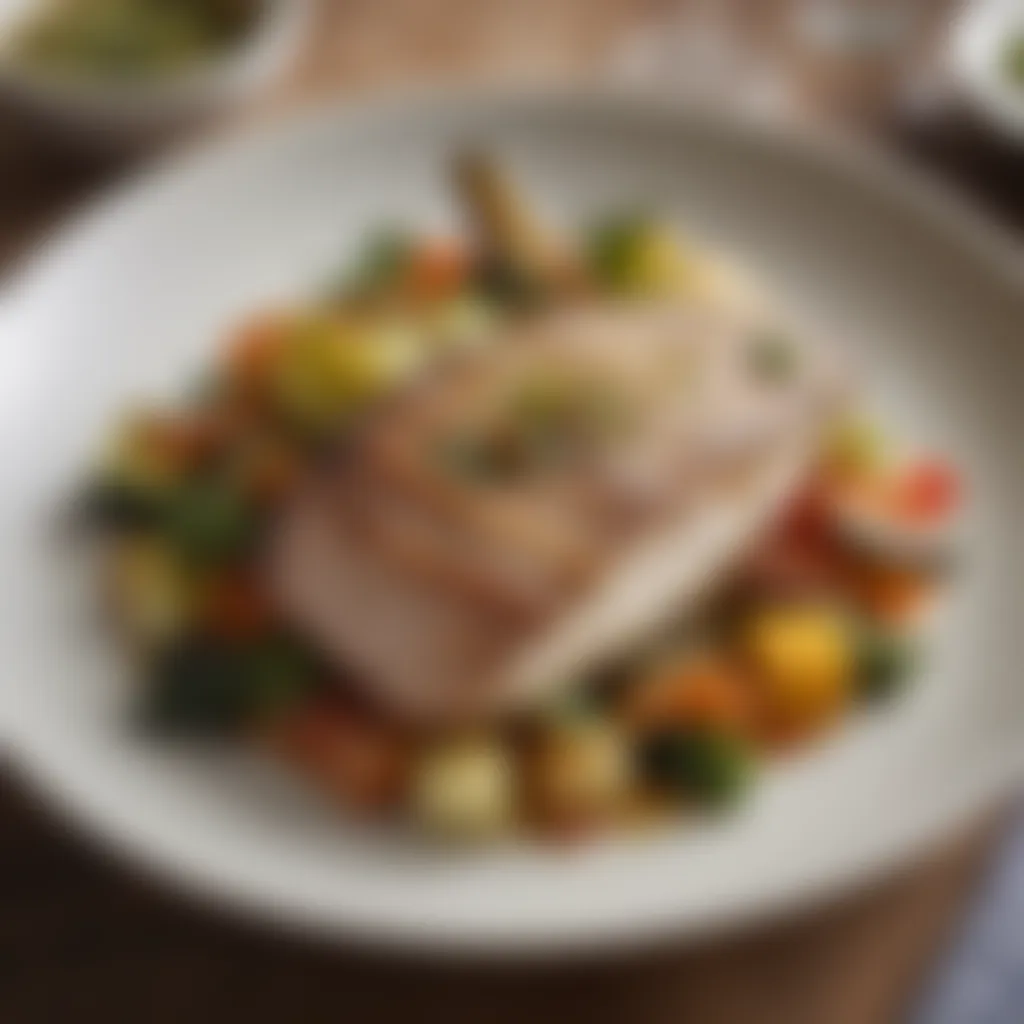
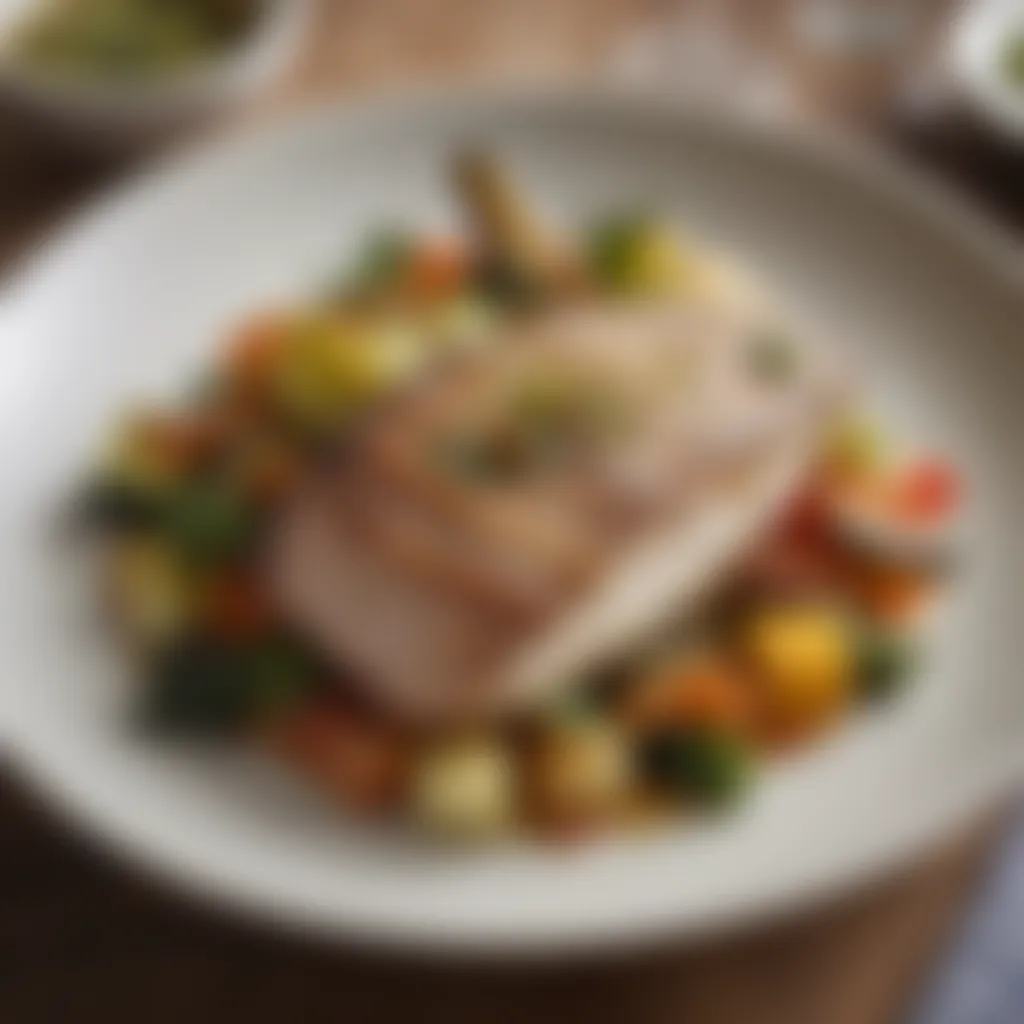
Cleaning and filleting bangus might seem straightforward, but there are some tips and tricks that make a world of difference. First off, you want to ensure that the fish is fresh and properly handled to avoid any unpleasant odors or flavors. Start by rinsing the bangus under cold water to remove any impurities. A sharp knife is your best friend in this case, as it will allow you to make clean cuts and avoid tearing the flesh. The belly cavity needs to be opened carefully, ensuring that you remove the innards without damaging the meat.
After that, the real magic happens during the filleting process. Make an incision behind the pectoral fins and along the spine to separate the meat from the bones. Slowly glide the knife along the ribs, ensuring you maximize the yield. This practice not only helps you develop your skills, but also shows respect for the fish and its culinary value.
Marinades and Seasonings
Marinades and seasonings can take your bangus from good to absolutely memorable. Knowing whether to go with a bland or flavored marinade can change how the fish interacts with other ingredients in your dish.
Bland vs. Flavored Marinades
Bland marinades usually consist of simple ingredients like salt and a bit of vinegar or lemon juice. They allow the natural flavor of the bangus to shine through. This approach can be beneficial if you’re aiming for a dish that’s primarily focused on the fish’s own taste. Bland marinades give you the chance to taste the essence of the bangus itself, which can be particularly nice in grilled preparations.
On the other hand, flavored marinades typically include herbs, spices, and other ingredients that add layers of taste. This option is popular for imparting a more complex flavor profile, ideal for dishes requiring cooking methods that don't necessarily enhance the fish's taste on their own, like steaming or baking. The unique feature of flavored marinades is their versatility; you can experiment by combining different spices until you find your personal favorite blend.
Regional Variations in Seasoning
Regional variations in seasoning can truly highlight the adaptability of bangus in diverse culinary traditions. For instance, Filipino cuisine often employs patis (fish sauce) and calamansi to create a zesty profile, while Thai recipes might lean toward using lemongrass and chili for a spicier kick.
This incorporation of local ingredients not only enhances the dish but also personalizes it to suit cultural preferences. The unique feature here is the way these seasonings interact with the fish. Different regions have developed their own signature ways to embrace bangus, which results in rich flavors and connections to heritage. It opens the door for creativity in the kitchen, allowing cooks to honor traditional practices while experimenting with modern twists.
"The way you season your bangus can tell a story; each culture leaves its mark through the ingredients they hold dear."
In essence, mastering the preparation techniques for bangus involves understanding the art of cleaning, filleting, and enhancing flavors through marinades and seasonings. Whether opting for simplicity or complexity, your choice sets the tone for how the dish will be experienced by family and friends alike.
Cooking Methods for Bangus
When it comes to cooking bangus, understanding the various methods is crucial. Each technique offers a unique flavor profile and texture that can either highlight the fish's natural qualities or transform it into a completely new dish. Mastering these methods not only enhances your cooking prowess but also allows you to experiment and tailor meals to your family's palate. From grilling to sautéing, these techniques reveal the diverse culinary potential of bangus.
Grilling Techniques
Grilling bangus can produce a stunning dish with a smoky aroma and charred flavors that may impress any dinner guest. To ensure the fish shines, opt for a moderate heat. This allows it to cook evenly without burning the outside. Here are some tips for perfecting your grilling game:
- Choose the right grill: Whether using charcoal or gas, make sure the grill is preheated. A well-aimed heat will help to get those beautiful grill marks.
- Oil and Season: Apply a light coat of oil to the grill grates to prevent sticking. Season the bangus well, keeping in mind that strong marinades can overpower the fish. Lemon, garlic, and herbs work wonders without masking its natural taste.
- Monitor the time: Bangus cooks fairly quickly, so keep an eye on it—about six to eight minutes should suffice for a medium fillet.
Grilling can turn this tender fish into a delectable centerpiece for summer gatherings or family meals. The smokiness laid on top of the soft, flaky bangus can be a game changer!
Steaming Methods
Steaming bangus preserves its moisture and nutrients while lending a delicately tender finish. This method is fantastic for those seeking a healthier meal option. Steaming also allows for the infusion of flavors without drying out the fish. To master steaming:
- Prepare a steamer: You can easily use a bamboo steamer or a metal steamer basket set over a pot of boiling water.
- Seasoning before steaming: While it might be tempting to skip this step, don’t. Adding flavors to the fish pre-steaming will result in a flavor explosion when the fish is fully cooked.
- Timing: Generally, steaming takes about 10-15 minutes, depending on the size of the fillet. A good tip is to check the flesh for a flakiness that indicates it's ready.
Steamed bangus pairs perfectly with a drizzle of soy sauce or fresh herbs. Eating it this way can truly resonate with the traditional methods used in various cultures.
Sautéing and Frying Techniques
Both sautéing and frying lend crispy, golden goodness to bangus, providing a delightful contrast to its soft texture. The difference lies in the amount of oil used and the end result you hope to achieve. Here's how to go about it:
- Sautéing: Use a moderate amount of oil, just enough to coat the bottom of the pan. Heat the skillet before adding bangus, ensuring that each side is seared well. The objective here is to cook the fish quickly to retain moisture.
- Frying: If you’re eyeing a crunchy exterior, then frying’s your buddy. Here, the key is in the batter or breading you choose. A simple flour dredge can give that lovely crisp. Ensure the oil is hot enough; a simple drop of water should sizzle when it hits the surface.
Both techniques create an inviting texture and an added layer of flavor. Sautéed or fried bangus can be beautifully paired with a tangy sauce for a satisfying finish.
The way you cook bangus can elevate your meals, turning simple ingredients into culinary masterpieces!
Experiment with different methods, and you may just find a favorite that becomes a staple in your cooking repertoire.
Exploring Regional Recipes
Exploring regional recipes is like taking a culinary tour without ever leaving your kitchen. It opens up a treasure trove of flavors and traditions, each unique to its locality. For those looking to master bangus, or milkfish, incorporating various cultural interpretations into your cooking repetoire comes with a ton of benefits. Not only does it enhance your understanding of the fish's versatility, but it also allows you to play with distinct seasonings and methods that highlight bangus' natural qualities.
In this section, we dive into the heart of bangus cooking, focusing on both Filipino and international perspectives. By doing so, we can see how regional methods and ingredients complement the fish, leading to dishes that leave a lasting impression on the diner.
Filipino Signature Dishes
Sinigang na Bangus
Sinigang na Bangus stands tall among Filipino dishes, celebrated for its bright and tangy flavor profile. This sour soup traditionally features vegetables like radish and eggplant, all mingled with the milkfish to create a harmonious dish that captures the essence of Filipino comfort food. The key characteristic of sinigang is its use of tamarind or other souring agents, such as calamansi or green mango.
The sourness is balanced perfectly by the natural sweetness of the milkfish, making it a beloved choice in many homes. For readers aiming to elevate their cooking, sinigang na bangus shines as a canvas for creativity, offering options for choosing different souring agents based on one's taste preferences.
"Cooking is much like art; there’s no right or wrong, just what you love."
One unique feature of this dish is that it can easily adapt to whatever ingredients you have on hand. If you're out of some vegetables, you can substitute others, maintaining the integrity of the dish while using what’s available. However, potential downsides include its lengthy cooking time; patience is essential when you want that broth to develop its rich, layered flavors.
Daing na Bangus
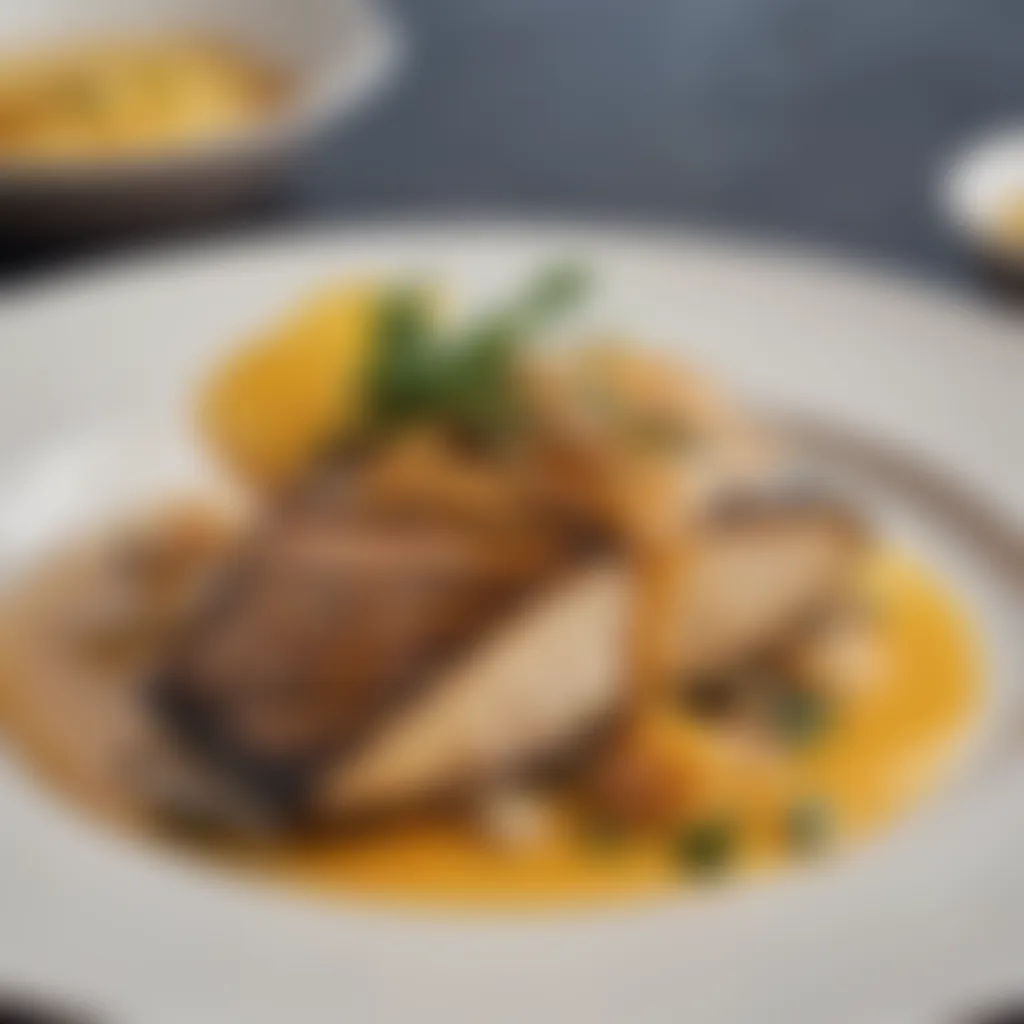
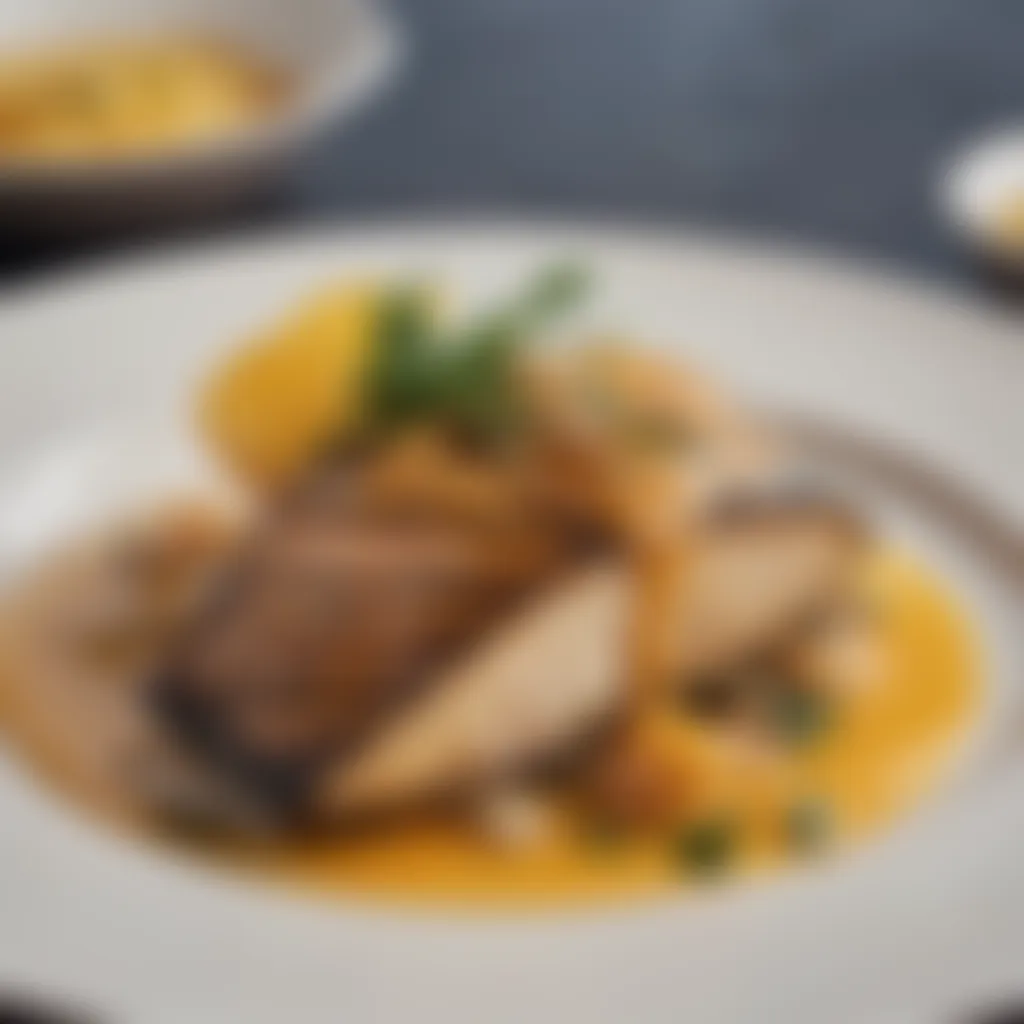
Another gem in the crown of Filipino cuisine is Daing na Bangus, which showcases a different style altogether. This dish consists of marinated bangus that’s butterflied and then fried until crispy. The marinade, typically made from vinegar, garlic, and peppercorns, gives the fish a robust flavor, lending itself well to local and family variations.
What stands out about daing na bangus is its crispy texture, combining perfectly with the moist flesh of the fish. Many cooks find it a favored choice because it not only offers deep flavor but also pairs wonderfully with a side of garlic rice and fried eggs, making it a complete meal.
One unique feature of daing na bangus is the contrasting crispy and tender textures. It leaves diners wanting more with every bite. However, one must be cautious about over-frying, which can lead to a dry outcome. For those looking to explore more Filipino recipes, mastering daing na bangus is a satisfying endeavor.
International Interpretations
Bangus in Southeast Asian Cuisine
When we venture beyond the Philippines, Bangus in Southeast Asian Cuisine reveals its adaptability in various culinary landscapes. Countries such as Indonesia and Malaysia have their takes on this versatile fish, incorporating it into traditional stews and grilling methods. Here, bangus might be marinated in a mix of local spices, which elevates the fish into a whole new dimension.
A key characteristic of this culinary interpretation is the bold use of spices and flavors that characterize Southeast Asian cuisine. It allows bangus to stand out and forms a bridge connecting it to various regional ingredients, making it accessible to a wider audience. The advantage of these international methods is the fusion of flavors that can transform a simple piece of fish into a remarkable dish suitable for special occasions.
But, it’s essential to note that with these bold flavors, the delicate nature of bangus can sometimes get lost. It requires careful balancing of spices to ensure the fish remains the star of the show.
Bangus and Mediterranean Fusion
The culinary world is also witnessing the Bangus and Mediterranean Fusion, proving bangus can swim alongside traditional Mediterranean ingredients elegantly. Dishes like bangus prepared with a herbaceous tomato sauce or stuffed with olives and feta show just how open-ended this fish can be.
This fusion is characterized by the use of fresh herbs and subtle flavors common in Mediterranean cuisine. By employing techniques such as grilling or baking with olive oil, you can achieve a dish that is both flavorful and healthy. One advantage of this approach is that it introduces a refreshing spin on traditional recipes, attracting those eager for new tastes while still appreciating the foundation of bangus.
However, cross-cultural experiments might not always resonate with purists who cherish traditional preparations. The dish could be viewed as losing its identity, which is a consideration for the creative cook.
In summary, delving into regional dishes gives bangus a richly flavored narrative, allowing it to transcend cultural boundaries. Thus, whether one is simmering sinigang on a rainy day or crafting a Mediterranean masterpiece, the possibilities are vast and delightful.
Presenting Bangus Dishes
When it comes to enjoying a meal, presentation plays a crucial role in making the experience memorable. Especially with a dish as delicate and nuanced as bangus, the way it's presented can elevate the entire dining experience. Not only does it engage the senses, but it also showcases your culinary skill and attention to detail.
In presenting bangus dishes, you're not just serving a meal—you're crafting an art piece that reflects cultural heritage and personal creativity. A well-presented dish invites appreciation and can spark conversations at the dinner table. It encourages diners to take a moment to savor the sight before they dive in.
Plating Techniques
The plate is a canvas. The right plating techniques can transform a simple bangus dish into a stunning centerpiece. When plating, consider colors, shapes, and textures. Each element should contribute to the overall aesthetic. For bangus, the following techniques can be particularly effective:
- Choose the Right Plate: A clean white plate often highlights the colors of the fish and accompanying ingredients, making the meal visually appealing.
- Layering: Introduce depth by layering bangus with fresh vegetables or herbs. This can create a vibrant contrast, drawing the eye toward the fish's beautifully cooked fillets.
- Sauce Art: If you're using a sauce, consider placing it in a swoosh or a dot on the plate. This not only enhances the dish's appearance but also gives guests an invitation to explore flavor combinations with each bite.
- Negative Space: Don't overcrowd the plate. Embrace negative space, allowing the dish to breathe. A spacious layout can make the meal feel more gourmet.
Tip: Avoid using too many colors or ingredients that clash. Less is often more when it comes to plating.
Garnishing Ideas
Garnishing is the cherry on top; it can turn a good dish into a great one. With bangus, the choice of garnishes can add flair and enhance flavor:
- Fresh Herbs: Chopped cilantro or green onions can provide a burst of color and a fresh taste that complements the fish comfortably.
- Citrus Zest: A sprinkle of lemon or calamansi zest can add brightness, which balances the richness of the fish. A subtle touch can create a delightful contrast.
- Peppered Sprouts: A handful of microgreens or bean sprouts can lend a crunchy texture, offering a pleasant surprise amidst the softness of the bangus.
- Edible Flowers: For those looking to impress, consider edible flowers. They not only add beauty but also a subtle flavor, enhancing the overall eating experience.
Remember, a garnish should never overwhelm the dish. It’s meant to enhance and complement your beautifully cooked bangus.
In summary, focusing on plating and garnishing techniques can elevate the perception of your bangus dishes. This attention to how your meal looks and feels will not only please your guests' eyes but will also enrich their overall experience with the food.
Pairing Bangus with Sides and Sauces
In the culinary world, few things elevate a meal quite like the right accompaniment. Pairing bangus with sides and sauces not only enhances its flavors but also enriches the overall dining experience. When considering what to serve alongside bangus, it’s essential to balance its distinct taste and texture. The right pairing can bring out the subtle nuances of the fish, making it the star of the table. Moreover, understanding these pairings can significantly affect how a housewife approaches meal preparation and guests’ satisfaction.
Complementary Side Dishes
The beauty of bangus lies in its versatility. Pairing it with complementary side dishes can transform a simple meal into something memorable. Remember that the side dishes should enhance rather than overpower the fish. Here are a few options to consider:
- Steamed Vegetables: A medley of vibrant vegetables, like broccoli, carrots, and bell peppers, offers a fresh crunch that contrasts well with the softness of the fish. It’s healthy and colorful, making the plate visually appealing.
- Garlic Rice: A staple in many Filipino households, garlic rice is an excellent choice. The aromatic garlic flavor beautifully complements the subtleness of bangus, making every bite delightful.
- Mashed Potatoes: Creamy mashed potatoes can provide a comforting side that pairs well with grilled or sautéed bangus. Their buttery texture accentuates the fish’s richness.
- Pickled Vegetables: Acidity can be your secret weapon. Serving bangus with pickled vegetables or achara adds a zesty kick that contrasts the richness of the fish.
Ultimately, the ideal side dishes are those that highlight the fish’s flavor without overshadowing it. A good principle is to keep it simple and let the bangus shine through.
Sauces that Enhance Flavor
Sauces can be pivotal in amplifying the taste of bangus, turning a regular meal into a culinary masterpiece. Here are some sauces that serve as fantastic companions:
- Soy Sauce Mixture: A classic in many Southeast Asian dishes, a simple mixture of soy sauce, calamansi juice, and spices can add depth and zest to your fish. Just a drizzle can make a world of difference.
- Chili Garlic Sauce: For those who enjoy a kick, this sauce combines the spice of chili with the warmth of garlic. It adds heat and excitement that will leave your guests craving more.
- Coconut Sauce: A creamy coconut sauce with a hint of lime can complement the richness of bangus, especially in dishes where the fish is cooked in a broth.
- Tomato Salsa: Fresh salsa made from tomatoes, onions, and cilantro can provide a refreshing contrast to the flavor profile of bangus. This light sauce brings an element of brightness.
When you're crafting a bangus dish, don't hesitate to experiment with different sides and sauces. Remember, each bite is a chance to create an experience that your family or guests will remember. Pairing effectively can be an art, but with a bit of creativity, it can be mastered.
Common Mistakes When Cooking Bangus
Cooking can be a delightful journey, but it often comes with its own set of pitfalls. When it comes to bangus, or milkfish, understanding common mistakes can make a world of difference in taste and texture. This section highlights those errors, ultimately guiding you closer to a perfectly cooked bangus. Avoiding these pitfalls not only enhances your culinary skills but also improves the overall dining experience for you and your loved ones.
Undercooking vs. Overcooking
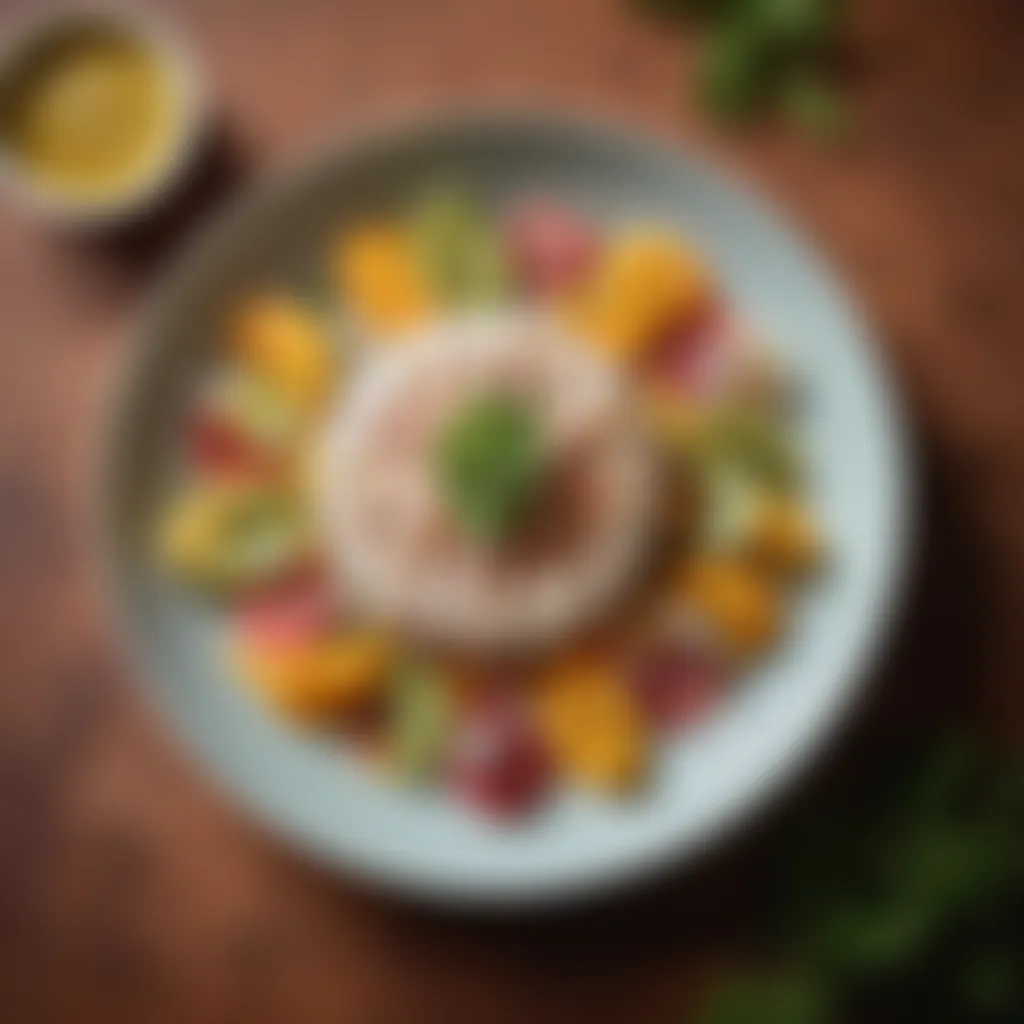
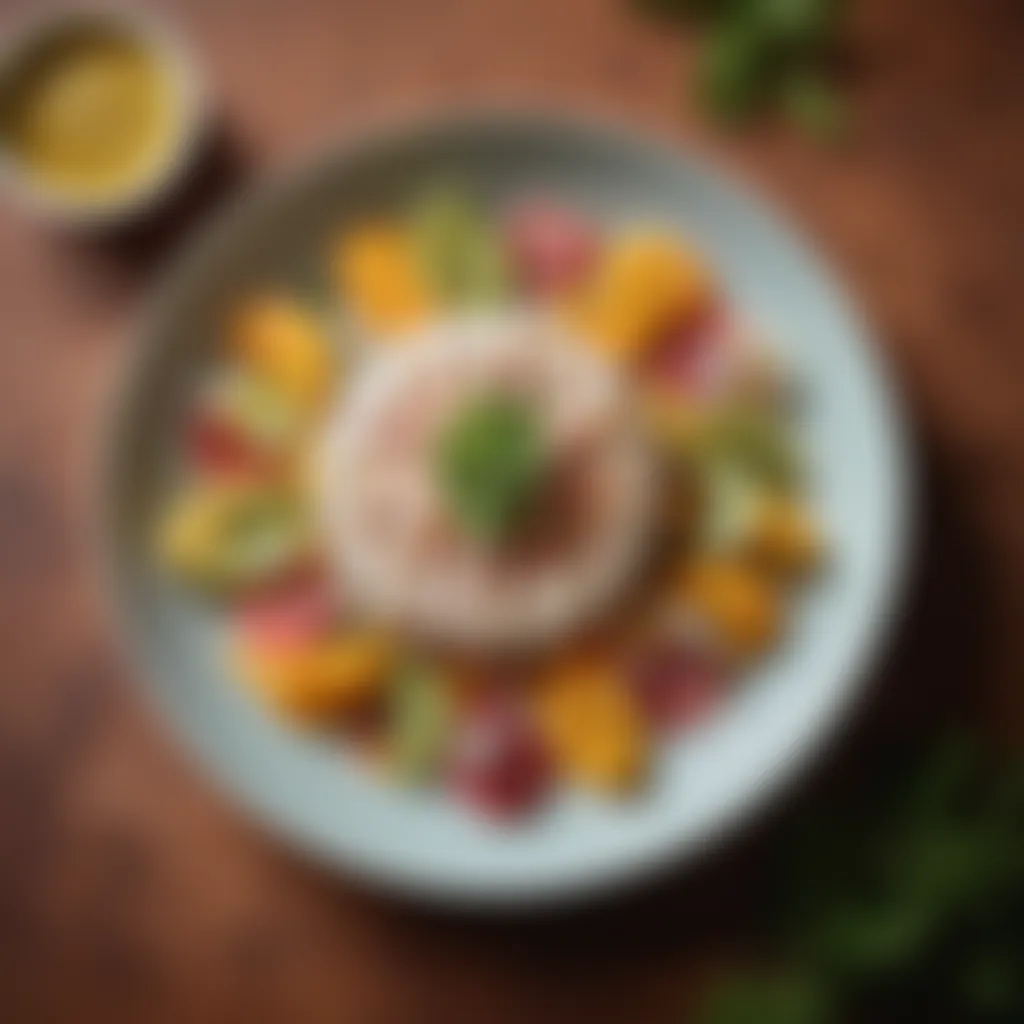
One of the crucial aspects of cooking bangus lies in the timing. Undercooking results in a raw or slimy texture, which can be unappetizing. On the other hand, overcooking leads to a dry and tough piece of fish. Bangus has a delicate structure, and it's essential to hit that sweet spot where it is just right.
For optimal cooking, a few key points stand out:
- Cooking temperature: Typically, bangus should be cooked to an internal temperature of around 145°F (62.8°C). Use a kitchen thermometer for precision.
- Cooking methods: Different methods have their own cook times; for instance, grilling generally takes less time compared to baking.
- Visual cues: Look for the fish to become opaque and easily flake with a fork, which indicates doneness. If it still looks translucent, give it a bit more time.
A common error is removing the fish too soon due to impatience or misjudgment. If unsure, it’s better to check more frequently in the last few minutes of cooking to prevent undercooking.
"Cooking is about precision; timing plays a key role in bringing out the best in your dishes."
Inadequate Seasoning
Another common pitfall when preparing bangus is inadequate seasoning. If you skimp on spices or seasoning, you run the risk of serving a bland dish that fails to please.
To elevate your bangus, consider the following:
- Marinades: Marinating your fish at least 30 minutes before cooking can significantly enhance flavor. Use a mix of ingredients like soy sauce, ginger, and garlic for a boost.
- Balance of flavors: Bangus can hold up well against bold seasonings, so don't hold back. Bold blends work well, especially with regional recipes that incorporate local spices.
- Taste as you go: Always sample your seasoning. If needed, add a pinch more salt or a splash of vinegar to brighten the flavors. Cooking is as much about intuition as it is about following a recipe.
Inadequate seasoning can make any dish fall flat, especially bangus, known for its subtle flavor profile. Striking the right balance will transform your meal from mediocre to memorable.
Storage and Preservation Techniques
When it comes to bangus, knowing how to store and preserve it properly can make all the difference in maintaining flavor and freshness. Not only can this extend the shelf life of the fish, but it also ensures that you have quality ingredients at your fingertips whenever you’re ready to whip up a delightful meal. Mastering storage techniques is particularly important given that bangus, or milkfish, can spoil quickly if not handled properly. Understanding some key principles is essential for any home cook who wishes to elevate their culinary experience with this versatile seafood.
Freezing Bangus
Freezing is one of the best and most effective ways to keep bangus fresh over time. It stops the aging process, preserving the fish at its peak flavor. Here’s how to go about it:
- Cleaning: Start by cleaning the bangus thoroughly. Remove the scales, insides, and rinse it under cold water. Make sure it’s spotless to avoid any lingering odors.
- Pre-portioning: If you have a large bangus, consider filleting it into manageable pieces. This makes later cooking easier and the chance of freezer burn is reduced.
- Packaging: Take the cleaned pieces and wrap them tightly in plastic wrap. Remove as much air as possible to prevent freezer burn. For added protection, place the wrapped fish in a resealable freezer bag or an airtight container.
- Labeling: It’s always a good idea to label your packages with the date. Frozen bangus is best used within three months for optimal quality.
- Freezing: Finally, lay the packages flat in the freezer to freeze them more quickly. Once solid, you can rearrange them as needed.
This method not only helps in preserving the flavor but also allows you to stock up and save money in the long run.
Using Bangus in Leftover Creations
One of the joys of cooking is transforming leftover ingredients into something new and exciting, and bangus is no exception. If you find yourself with leftover cooked bangus, here are a few delightful ways to utilize it:
- Bangus Flakes: Simply flake the leftover fish and mix it with mayonnaise, diced onions, and a sprinkle of lime juice to create a bangus spread for sandwiches or wraps.
- Soups: Use bangus remnants to make a comforting soup. Simply add the fish to a broth along with some vegetables and spices for a quick meal.
- Bangus Omelette: Whip up a delicious breakfast by incorporating the flaked fish into an omelette. Just add some cheese, tomatoes, or your favorite veggies for added flavor.
These tricks not only enhance your meal planning but also ensure that precious ingredients don’t go to waste. It helps in creating a sustainable kitchen, providing an economical approach while still featuring bangus in delicious ways.
Culinary Innovations with Bangus
Culinary innovations with bangus offer a fresh perspective on how this versatile fish can fit into modern cooking. Bringing new flair to traditional dishes highlights the adaptability of bangus and allows for creativity in the kitchen. This section aims to inspire you, especially if you're looking to step out of your comfort zone and experiment with flavors and pairings that you might not have imagined.
Incorporating Bangus into New Dishes
When you think of bangus, classic dishes might come to mind, but why not take a leap into unfamiliar territory? Incorporating bangus into new dishes can be a delightful adventure. Imagine a bangus enchilada or a bangus quiche.
- Bangus Tacos: Swap out your typical fish for bangus. Use a simple marinated bangus fillet and pile it into soft corn tortillas with avocado, cabbage, and a smoky chipotle sauce. This twist not only keeps the flavors bright and lively, but it caters to a diversity of tastes.
- Bangus Risotto: Imagine creamy risotto enriched with bangus and fresh herbs. The fish can be flaked into a rich, Parmesan-laden risotto, providing a unique texture and flavor that elevates your usual preparation.
- Bangus Sushi Rolls: Think outside the box. Use bangus as the star ingredient in sushi rolls. Its soft texture can supplement avocado and cucumber perfectly, leading to a delightful combination of flavors when dipped in soy sauce.
Each of these ideas reinterprets bangus while still honoring its identity. By being innovative with how you use this ingredient, you ensure your meals stay fresh and appealing.
Fusion Cuisines Involving Bangus
Fusion cuisines open the door to an experimental approach to culinary arts, and with bangus, the possibilities are vast. Blending different cultural elements can lead to stunning dishes that not only taste amazing but also broaden your cooking repertoire.
- Bangus and Indian Spices: Incorporate ayurvedic spices like turmeric, cumin, and coriander in a bangus curry. This creates a rich, fragrant dish, replete with health benefits, representing vibrant Indian flavors without overshadowing the delicate profile of bangus.
- Bangus Paella: Think Spanish! By using bangus in a seafood paella, you create a unique version that pays homage to both cultures. Mixing in saffron and freshly chopped vegetables, this dish can surprise and delight anyone around the dinner table.
- Bangus Sashimi: Recognizing the culinary techniques of a different culture can elevate how you enjoy bangus. By presenting it as sashimi, paired with wasabi and a drizzle of soy sauce, you can enjoy bangus in a completely fresh way.
"The best part of culinary innovation is that it helps blend flavors and cultures, making every meal a journey rather than just a source of sustenance."
In summary, the culinary world continually evolves, and so too does the use of bangus within it. Through adopting new recipes and blending them with traditional culinary techniques, you can master the art of bangus in ways you may have thought impossible. This approach not only enhances your cooking skills but also enriches the dining experience for you and your family.
Closure
The journey into the world of bangus cooking culminates in a realization of its many layers, from its rich history to the techniques that bring out its best flavors. Reflecting on mastery of bangus cooking sheds light on the efforts required to appreciate this fish fully. It’s not merely about flipping a few fillets in a pan; it’s about understanding the choices we make on our plates and within our kitchens.
Reflecting on Mastery of Bangus Cooking
Mastery in cooking bangus isn't just about knowing how long to grill or what marinade to use. It's about developing a relationship with the ingredient itself. As any seasoned cook will tell you, perfecting the art of cooking is a mixture of science and artistry. Bangus, with its distinct flavor and texture, asks for careful attention. The more you engage with it, the more you develop an instinct for what works best. So, when you’ve achieved a beautifully grilled bangus that pairs flawlessly with a side of sautéed vegetables, the satisfaction is compounded by the knowledge gained in the process.
In honing these skills, you not only learn culinary techniques but also gain an appreciation for the culture that surrounds bangus. It might be a dish shared at the family table, or perhaps something enjoyed during festive occasions. Each bite resonates with stories and traditions that impart a greater meaning to the cooking experience.
Future Culinary Explorations
Looking ahead, the kitchen expands like an unexplored territory once you’re comfortable with bangus. There’s no end to the innovations you can introduce. Imagine incorporating bangus into diverse culinary styles—sushi rolls, creamy pasta dishes, or even gourmet tacos. The versatility is immense, and the potential to explore new flavors is both exciting and liberating.
Additionally, you might consider taking classes or joining community discussions. Engaging with fellow food enthusiasts on platforms like Reddit or visiting culinary forums on Facebook can present fresh perspectives on bangus that you may not have considered.
If you find yourself wandering into the realms of fusion cuisine, remember also to stay rooted in the traditions that celebrate bangus. The balance of innovation and respect for classic dishes will serve you well in your culinary explorations.
Ultimately, the endeavor to master bangus cooking can lead to not just new recipes but a new appreciation for the art of cooking itself. From family favorites to daring experiments, each step forward enriches your culinary knowledge and skills. Embrace this journey, and let your creativity take flight!







